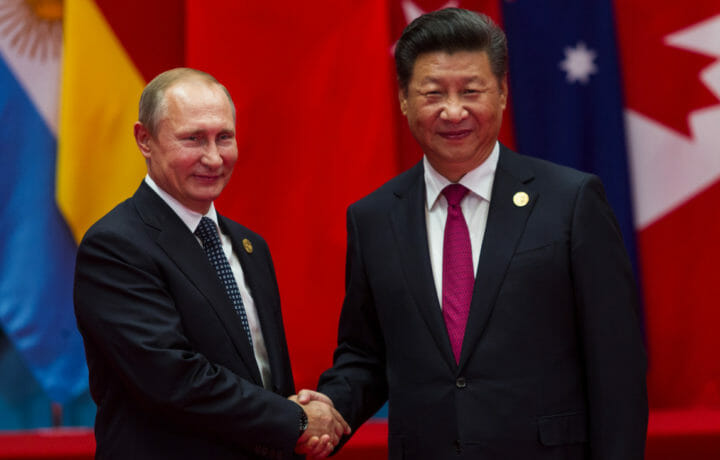China continues to posture itself as neutral and peacemaker in the Ukraine War, but has yet to condemn the Russia invasion. At best, China is turning a blind eye to the Russian invasion of Ukraine – at worst, facilitating. Regardless of Beijing’s efforts to play peacemaker, Western leaders are showing their concern.
In Demark on Monday, Former British Prime Minister Liz Truss stated that Western nations cannot allow President Xi Jinping to have influence in shaping the War’s outcome. During the Copenhagen Democracy Summit, Truss stated, “I think it was President Xi Jinping who described it as ‘a friendship without limits.’ And it’s increasingly clear that Russia is now the junior partner of China. And China is, in my view, the major threat that the world is facing.” Regardless, most observers agree the Ukraine War is strengthen relationships between Moscow and Beijing, paving the way for a “Dragon-Bear” alliance.
Macron’s Comments with Zelensky in Paris
During an interview over the weekend, French President Emmanuel Macron stated that the Ukrainian offensive has isolated Russia and they have suffered a “geopolitical defeat” and they have “entered a form of subservience with regards to China and has lost its access to the Baltic, which was critical, because it prompted the decision by Sweden and Finland to join NATO.”
Macron’s comments came just before Ukraine’s President Volodoymyr Zelensky surprise visit to Paris. During the visit, France pledged additional military aid for Ukraine, including light tanks, armored vehicles, and training for soldiers.
Kremlins Response
The Kremlin spokesman Dmitry Peskov quickly responded on Monday to Macron’s comments. Peskov told Kremlin reporters that Macron’s comments displayed “an absolutely wrong understanding of what is happening” and that “We categorically disagree with this. Our relations with China have the character of a special, strategic partnership.”
Does China Really want Peace?
Analysts think Beijing longs to bring an end to the War which is causing global economic instability through its unpredictable nature and unknown endpoint. Further, China continues to position itself as a peace broker and offers to mediate between the countries. Ryan Hass, a China expert at the Brookings Institution gave his reasoning for China’s desires, stating, “China is more focused on winning the peace than on who wins the war between Russia and Ukraine.” Hass reinforcing Liz Truss’ comments, adding, “Beijing would like to have a voice in determining the contours of any future European security architecture. Beijing also would like to be seen as vital to Ukraine’s reconstruction and as a key actor in Europe’s broader recovery from the conflict.”
Regardless, Beijing remains too close to Russia. Further, the Chinese remain ideologically aligned with Moscow’s anti-Western thought. By way of example, there have been 20 phone calls and several state visits between Russian President Vladimir Putin and Chinese President Xi Jinping since the war began. Xi called Zelensky for the first-time last month, where he promised to send special representatives to Ukraine to hold cease-fire talks with all parties and to seek a peaceful resolution.
Potential china Alliance Ahead
This week could prove promising, as China’s special representative on Eurasian affairs, Li Hui, will visit Ukraine, Russia and other European countries. China’s foreign ministry stated Friday that there will be talks discussing “a political settlement of the Ukraine crisis.”
However, positioning themselves as an honest broker with the desire to end the most costly and deadly war in Europe for decades, there are many questions regarding China’s perceived neutrality. China still has not recognized Russia as the aggressor and continues to blame the U.S. and NATO for the war. Entering negotiations with this failing and a perceived desire to shape the endgame, may prove challenging for Chinese diplomacy.
The U.S. Position
Early this month, Secretary of State Antony Blinken stated there was “nothing wrong” with the U.S. working in parallel with China to restore peace in Ukraine. During the conference Blinken added, “As a matter of principle, countries, particularly countries with significant influence like China, if they’re willing to play a positive role in trying to bring peace, that would be a good thing.”
Should the U.S. believe total victory in Ukraine is unlikely anytime soon, the choice for supporting an agreeable Chinese brokered peace agreement may be a more reasonable approach than financially supporting a prolonged stalemate.




